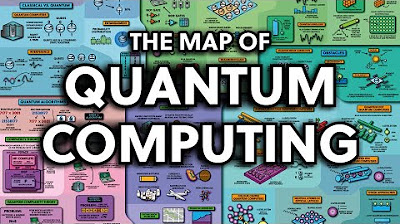What Is Quantum Computing? | Quick Learner
Summary
TLDRThe video introduces quantum computing by comparing it to classical computing. While traditional computers process information using binary bits (0s and 1s), quantum computers use qubits that can represent both 0 and 1 simultaneously. This enables quantum computers to solve complex problems at exponentially faster rates, potentially reducing problem-solving time from thousands of years to seconds. However, quantum computers are delicate and require extremely cold conditions to function. Despite their promise for advances in fields like medicine and energy, classical computers remain the most practical and economical solution for most everyday tasks.
Takeaways
- 😀 Quantum computing is a revolutionary technology designed to solve complex problems much faster than classical computers.
- 😀 Classical computers use bits that represent binary states (0 or 1), while quantum computers use qubits that can represent both 0 and 1 simultaneously.
- 😀 Qubits enable quantum computers to process multiple variables at once, offering a significant advantage over classical computers.
- 😀 Quantum computers could potentially solve problems in seconds that would take classical computers hundreds of thousands of years.
- 😀 Traditional computers are widely used for tasks such as social media, word processing (e.g., Word, Excel), and video games, which rely on binary data.
- 😀 The power of quantum computing comes from its ability to exist in multiple states at once, akin to a spinning coin that doesn’t settle on heads or tails.
- 😀 Despite their speed, quantum computers are extremely fragile and need to be kept in isolation from heat and vibration.
- 😀 Quantum computers are maintained at ultra-cold temperatures, such as 0.015 Kelvin, much colder than interstellar space, to maintain their stability.
- 😀 Quantum computing promises breakthroughs in various fields, including battery technology and disease cure research.
- 😀 For most tasks, classical computers will remain the most practical and cost-effective solution due to the current limitations of quantum computing.
Q & A
What are the limitations of classical computing?
-Classical computing can solve many problems, but when the size and complexity of a problem increase beyond a certain point, it becomes impractical for traditional computers to solve them in a reasonable amount of time.
What is the fundamental principle behind all computers?
-All computers rely on the ability to store and manipulate information, typically using bits in classical computers, where each bit represents either a 0 or a 1.
How does classical computing work with binary data?
-In classical computing, data is represented in binary, where each bit can either be 0 or 1. This binary representation is used to perform computations and process information across various applications such as Word, Excel, and social media.
What is the key difference between classical bits and quantum qubits?
-Classical bits can only be either 0 or 1, while quantum qubits can represent both 0 and 1 simultaneously, thanks to a property called superposition.
How does quantum computing differ from classical computing in terms of problem-solving?
-Quantum computing allows for simultaneous consideration of multiple variables due to the superposition of qubits, making it far faster and more powerful for solving certain complex problems compared to classical computers.
How does the analogy of a coin flip help explain the difference between classical bits and quantum qubits?
-In classical computing, a bit is like a coin that can only land on either heads or tails. Quantum computing, on the other hand, is like spinning the coin, where both heads and tails can exist at the same time due to superposition.
What is the potential benefit of quantum computing over classical computing?
-Quantum computing could potentially be thousands of times faster than classical computing, dramatically reducing the time required to solve complex problems—from hundreds of thousands of years to mere seconds.
What are the challenges in developing quantum computers?
-Quantum computers are highly fragile and require extremely controlled environments, such as being kept at temperatures close to absolute zero, to maintain their quantum properties and avoid errors due to heat and vibration.
What is the temperature required to maintain the quantum state of a quantum computer?
-One quantum computer is kept at 0.015 Kelvin, which is about 180 times colder than interstellar space, to maintain its delicate quantum state.
Will quantum computers replace classical computers entirely?
-No, quantum computers are not expected to replace classical computers. While they promise advances in fields like medicine and battery technology, classical computers will still be the most practical and economical solution for most everyday tasks.
Outlines

このセクションは有料ユーザー限定です。 アクセスするには、アップグレードをお願いします。
今すぐアップグレードMindmap

このセクションは有料ユーザー限定です。 アクセスするには、アップグレードをお願いします。
今すぐアップグレードKeywords

このセクションは有料ユーザー限定です。 アクセスするには、アップグレードをお願いします。
今すぐアップグレードHighlights

このセクションは有料ユーザー限定です。 アクセスするには、アップグレードをお願いします。
今すぐアップグレードTranscripts

このセクションは有料ユーザー限定です。 アクセスするには、アップグレードをお願いします。
今すぐアップグレード関連動画をさらに表示

క్వాంటం సైన్స్ తో కంప్యూటర్ విప్లవం ఎలా ? || Computer Revoluation With Quantam Science ||

Your Guide to 100+ Qubits: Quantum Computing in Practice

Computação Quântica - Fundamentos e Aplicações - Aula 01

What Is Quantum Computing? | April 2, 2025

Les Ordinateurs Quantiques

The Map of Quantum Computing - Quantum Computing Explained
5.0 / 5 (0 votes)
